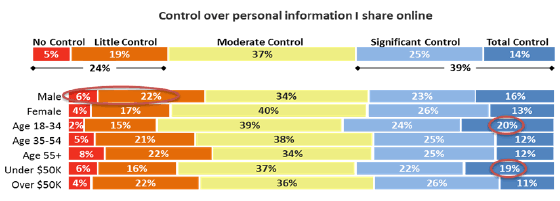 We’d like to wish everyone a very happy 5th annual Data Privacy Day. For the fifth year in a row, the US, Canada and 27 other countries have marked January 28th as a day to “raise awareness of and generate discussion about data privacy rights and practices.”
We’d like to wish everyone a very happy 5th annual Data Privacy Day. For the fifth year in a row, the US, Canada and 27 other countries have marked January 28th as a day to “raise awareness of and generate discussion about data privacy rights and practices.”
A variety of companies and publications have released new articles or information to mark the day. Microsoft released results of a new survey of 1,000 US adults that shows privacy is becoming more important to people, yet a sense of powerlessness pervades.
In the key findings of the report, 45% of people feel they have little or no control over personal information gathered by companies about them. Below is a graphic that shows how much control people feel they have over personal information shared online:

The circles on the graph indicate that men feel less in control over privacy than women while young people and those making incomes less than $50k a year have the strongest sense of control.
The Huffington Post has published an article marking the day and efforts to urge the US Congress into passing Electronic Privacy Reform. The Huffington Post article highlights the increasing disparity in privacy afforded to US citizens with regards to physical and virtual communication channels.
For example, email stored on web-based email services but used almost entirely from the home or mobile devices (like Gmail) may be obtained from US citizens without a warrant. Whereas a personal, physical letter sent to a home remain protected.
Individual choices around what personal data to keep private continue to focus on Facebook which encourages the open sharing and access to real personal data.
Facebook’s recent release of Graph Search has again highlighted concerns around the unexpected revelation of personal information. In the piece by The Nation, Ari Melber connects Graph Search to David Pozen’s paper (.pdf) in the Yale Law Journal describing the Mosaic Theory of intelligence gathering, where seemingly insignificant pieces of information can be assembled into a useable piece of intelligence on a person.
Unintentional sharing of personal data continues to be a problem, with the Online Trust Alliance announcement today that 242.6 million personal records were exposed in 2012. In their 2013 report on Data Protection and Data, they find that of 1478 breaches in 2012, over one-quarter were due to “internal incidents,” meaning personal data was revealed by members of the organization entrusted with personal data, rather than criminal mischief of those outside organizations.
Gliph is proud to be on the forefront of providing privacy not only around personal data, but also in building a system for communication and connection that offers real privacy.
In the Gliph company blog, we previously covered the efforts of the NTIA’s Privacy Multistakeholder Meetings that are aimed at realizing the Obama Administration’s Privacy Bill of Rights. We’ve also shared ideas for how startup companies can make privacy a strategic asset.
Some functional highlights from 2012 that added privacy to Gliph included the ability for users to securely delete Gliph messages, the release of Cloaked Email and an app access PIN to prevent casual snooping of Gliph conversations. We have some terrific additions that add additional opportunities to maintain privacy planned for 2013 and look forward to sharing them with you.
We urge everyone to take a moment today to consider what personal data they have currently available on the interent and thoughtfully consider actions they need to take in 2013 to take control of their privacy online.